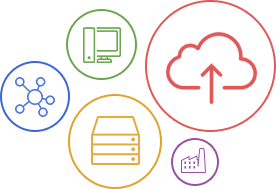"Cybersecurity threats are growing faster than most businesses can keep up." Emil Isanov, CEO and Founder of ETech 7
Cyber threats continue to escalate, putting businesses at constant risk of devastating attacks. On average, there is a hacker attack every 39 seconds and with hackers employing increasingly sophisticated tactics, relying solely on traditional antivirus software may no longer suffice.
The need for comprehensive, real-time protection has led many organizations to consider Endpoint Detection and Response (EDR) solutions.
But how do you decide between these two? Understanding the differences between EDR vs antivirus can help you determine the best approach for your business.
This blog will compare their strengths, weaknesses, and use cases to help you make an informed decision and ensure your business remains secure against evolving threats.
What is Antivirus Software?
Antivirus software has been the cornerstone of cybersecurity for decades. It focuses on detecting, blocking, and removing malicious software like viruses, worms, and trojans. Traditional antivirus solutions use signature-based detection, which relies on a database of known malware signatures to identify and block threats.
Become More Confident in Your Cybersecurity Posture
Strengths of Antivirus Software
- Simplicity and Ease of Use: Antivirus software is user-friendly and easy to install, making it accessible to businesses of all sizes.
- Cost-Effective: Antivirus solutions are generally more affordable than EDR systems, making them an attractive option for small businesses with limited budgets.
- Efficient for Known Threats: Signature-based detection is highly effective at identifying and removing known malware, ensuring basic protection against common threats.
Weaknesses of Antivirus Software
- Limited Protection Against Advanced Threats: Antivirus solutions struggle to detect and mitigate sophisticated cyber threats, such as zero-day exploits and APTs.
- Dependency on Signature Updates: Regular updates are required to maintain an up-to-date database of malware signatures, leaving gaps in protection if updates are missed.
- Reactive Approach: Traditional antivirus software often reacts to threats after they have infiltrated the system rather than preventing them from entering in the first place.
|
More resources you might like: |
What is Endpoint Detection and Response (EDR)?
EDR solutions represent a more advanced approach to cybersecurity, focusing on real-time monitoring, detection, and response to potential threats. EDR systems use behavioural analysis and machine learning to identify suspicious activity and unknown threats across endpoints.
Strengths of EDR Solutions
- Comprehensive Threat Detection: EDR solutions offer robust protection against various threats, including advanced and unknown threats that traditional antivirus software may miss.
- Proactive Threat Hunting: EDR systems actively search for potential threats within the network, enabling faster identification and mitigation of malicious activity.
- Automated Responses: EDR solutions can automatically respond to detected threats, isolating compromised endpoints and preventing the spread of malware.
Weaknesses of EDR Solutions
- Complexity and Resource Intensive: Implementing and managing EDR solutions requires significant resources, including skilled personnel and infrastructure.
- Higher Costs: EDR systems are typically more expensive than traditional antivirus solutions, which may be a barrier for smaller businesses.
- Steeper Learning Curve: EDR solutions often require extensive training for security teams to utilize their full capabilities effectively.
Key Features Comparison Between Antivirus and EDR Solutions
|
Feature |
Antivirus Solutions |
EDR Solutions |
|
Real-Time Monitoring |
Limited |
Extensive, continuous |
|
Threat Intelligence Integration |
Basic |
Advanced |
|
Incident Investigation |
Minimal |
In-depth forensic capabilities |
|
Threat Containment |
Basic isolation |
Automated, rapid containment |
|
User Behavior Analysis |
Not typically included |
An integral part of the solution |
|
Reporting and Alerts |
Standard alerts |
Detailed, customizable reporting |
|
Cloud Integration |
Often limited |
Strong cloud capabilities |
|
Regulatory Compliance |
Basic compliance tools |
Comprehensive compliance support |
|
Integration with Other Tools |
Limited |
High compatibility with other systems |
|
Scalability |
Suitable for small to mid-sized businesses |
Ideal for enterprises of all sizes |
Use Cases: Antivirus vs Endpoint Protection
When to Use Antivirus Solutions
- Small Businesses with Basic Security Needs: Traditional antivirus software provides sufficient protection against common threats for businesses with limited budgets and less complex IT environments.
- Endpoints with Minimal Exposure: Devices that do not frequently connect to external networks or handle sensitive data can rely on antivirus solutions for basic security.
When to Use EDR Solutions
- Large Enterprises with Complex IT Environments: EDR systems offer comprehensive protection to organizations with extensive networks and high-value data assets.
- Industries Facing Advanced Threats: Sectors such as finance, healthcare, and government, which are frequent targets of sophisticated cyberattacks, require the advanced capabilities of EDR solutions.
- Proactive Security Measures: Businesses prioritizing proactive threat hunting and real-time threat response will find EDR solutions more effective in safeguarding their assets.
Elevate Your Cybersecurity with ETech 7
Choosing between EDR vs antivirus depends on your business's needs, budget, and security goals. While traditional antivirus solutions provide basic protection against known threats, EDR systems offer advanced capabilities to detect and respond to sophisticated cyber threats in real-time. Investing in the right endpoint security solution is crucial for protecting your business from potential threats and ensuring the integrity of your valuable data.
|
Discover Trusted Cybersecurity Services Near You: |
We at ETech7 specialize in delivering tailored solutions to meet the unique security needs of businesses. Our expert team is dedicated to helping you implement the most effective strategies to protect your digital assets.
Contact us today to schedule a free consultation and take the first step towards securing your business.














